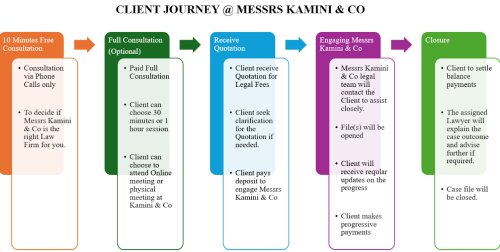Best Faith-Based Law Lawyers in Subang Jaya
Share your needs with us, get contacted by law firms.
Free. Takes 2 min.
List of the best lawyers in Subang Jaya, Malaysia
About Faith-Based Law in Subang Jaya, Malaysia
Faith-Based Law in Subang Jaya, Malaysia primarily pertains to the legal considerations and issues stemming from religious law and practices. In Malaysia, where Islam is the official religion, Islamic law (Sharia) operates alongside secular laws for Muslims, affecting areas like marriage, divorce, inheritance, and personal conduct. Non-Muslims are governed by civil law, but various faith-based communities may have internal guidelines that influence their legal needs. Subang Jaya, a diverse urban area, reflects this coexistence of civil and religious legal systems, prompting residents to sometimes seek legal advice that bridges these systems.
Why You May Need a Lawyer
There are multiple situations where individuals might seek legal assistance in Faith-Based Law in Subang Jaya. Common scenarios include:
- Marriage and Family Matters: Navigating marriage registrations, divorce proceedings, and child custody issues according to Islamic law.
- Inheritance and Wills: Distribution of assets according to Sharia inheritance laws.
- Religious Disputes: Resolving conflicts that touch upon religious practices or values.
- Business and Contracts: Ensuring business practices and contracts comply with Islamic principles, especially in matters like financing and loans.
- Community Affairs: Addressing disputes within religious communities about governance or religious tenets.
Local Laws Overview
Faith-Based Law in Subang Jaya is influenced predominantly by Islamic law for Muslims, as well as customary laws pertinent to other religious groups. Key aspects include:
- Syariah Courts: These courts handle cases relating to Islamic family law, betrothal, marriage, divorce, maintenance, and inheritance among Muslims.
- Family Law: Islamic Family Law Acts govern matters such as polygamy, marriage registration, divorce procedures, and custody.
- Inheritance Laws: Muslim inheritance is governed by Faraid, influencing how a deceased's estate is divided.
- Non-Muslim Legislation: While civil laws predominantly apply, specific legislation respects and acknowledges the traditions of various other religions practiced in Malaysia.
Frequently Asked Questions
What is Faith-Based Law?
Faith-Based Law refers to legal issues and doctrines that are influenced by religious principles, often seen in personal matters like family law, inheritance, and community governance.
What are Syariah Courts?
Syariah Courts are specialized courts in Malaysia that adjudicate matters pertaining to Islamic law for Muslims, covering areas like marriage, divorce, and inheritance.
Do Non-Muslims have to abide by Islamic law in Malaysia?
No, Non-Muslims are typically governed by civil law but faith-based internal guidelines may apply within their religious communities.
Can I draft a will under Islamic law?
Yes, Muslims can draft wills under the guidance of Islamic law, ensuring they comply with Faraid rules on inheritance.
How does Faith-Based Law affect business transactions?
For Muslims, business transactions often need to adhere to Islamic financial principles, prohibiting interest (riba) and ensuring ethical transactions.
What happens in custody disputes under Faith-Based Law?
Custody disputes for Muslims are resolved in Syariah Courts, focusing on the welfare and best interests of the child while taking religious principles into account.
Are there interfaith marriage rules in Malaysia?
Interfaith marriages involving a Muslim typically require the non-Muslim party to convert to Islam, as per Malaysian Islamic law.
Can I seek a resolution for religious disputes outside the courts?
Yes, mediation services are available and preferred for resolving community or religious disputes in a manner that respects the faith-based context.
What is the role of the Religious Council in Faith-Based Law?
The Religious Council serves to advise and support the application of Islamic law and offers community resources within the framework of Faith-Based Law.
Who can practice as a Faith-Based Lawyer in Malaysia?
A lawyer practicing Faith-Based Law in Malaysia must have a strong understanding of both the civil law and the relevant religious legal guidelines applicable to their cases.
Additional Resources
Several resources and organizations can support those seeking advice on Faith-Based Law:
- Jabatan Kehakiman Syariah Malaysia (JKSM): Offers guidance and information on Syariah court procedures.
- Malaysian Bar Council: Provides listings for legal practitioners specialized in Faith-Based Law.
- Majlis Agama Islam Selangor (MAIS): Provides resources related to Islamic law for the state of Selangor, including Subang Jaya.
- Religious Centers and Mosques: Often offer informal advice or can connect individuals with trained legal professionals versed in Faith-Based Law.
Next Steps
If you need legal assistance in Faith-Based Law within Subang Jaya, consider the following steps:
1. Identify Your Needs: Clearly define the issue or legal matter you need help with. This will assist in finding the most appropriate legal advice.
2. Consult the Right Legal Professional: Look for practitioners with expertise in both civil and Faith-Based Law.
3. Gather Necessary Documentation: Prepare all relevant documents ahead of your consultation to provide the lawyer with a clear understanding of your situation.
4. Schedule a Consultation: Arrange an appointment with a legal professional to discuss your case and explore your options.
Remember, understanding your rights and obligations under Faith-Based Law is paramount, and seeking specialized legal assistance is key in navigating these complex intersections of law and religion.
Lawzana helps you find the best lawyers and law firms in Subang Jaya through a curated and pre-screened list of qualified legal professionals. Our platform offers rankings and detailed profiles of attorneys and law firms, allowing you to compare based on practice areas, including Faith-Based Law, experience, and client feedback.
Each profile includes a description of the firm's areas of practice, client reviews, team members and partners, year of establishment, spoken languages, office locations, contact information, social media presence, and any published articles or resources. Most firms on our platform speak English and are experienced in both local and international legal matters.
Get a quote from top-rated law firms in Subang Jaya, Malaysia — quickly, securely, and without unnecessary hassle.
Disclaimer:
The information provided on this page is for general informational purposes only and does not constitute legal advice. While we strive to ensure the accuracy and relevance of the content, legal information may change over time, and interpretations of the law can vary. You should always consult with a qualified legal professional for advice specific to your situation.
We disclaim all liability for actions taken or not taken based on the content of this page. If you believe any information is incorrect or outdated, please contact us, and we will review and update it where appropriate.









